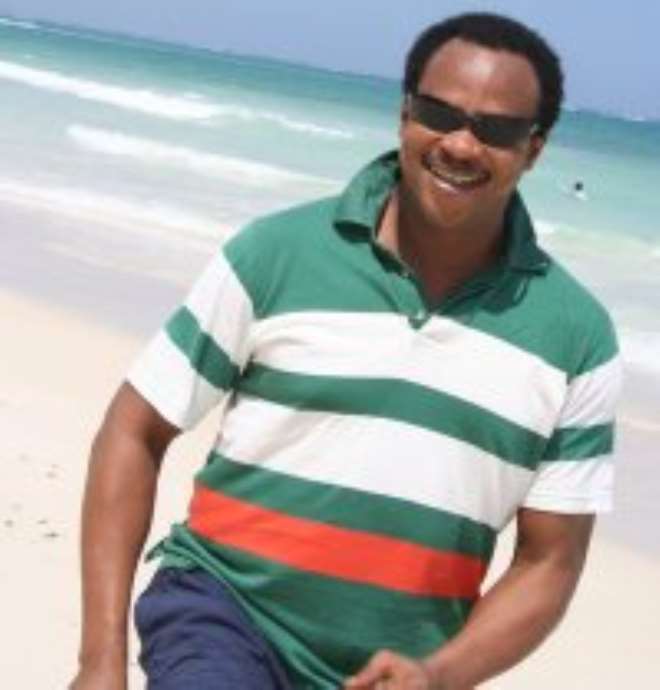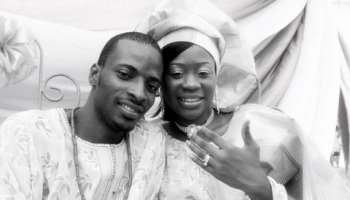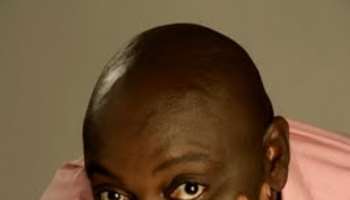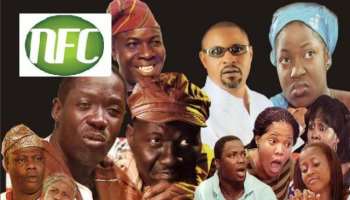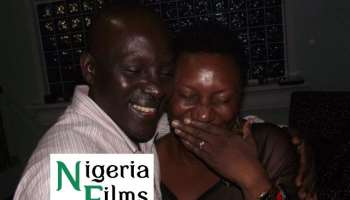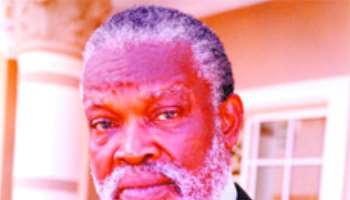I wanted to be a footballer – Fred Amata
Fred Amata is one of the many Nigerians that will be watching the world cup from the television screens. He however could have been one of those playing for Nigeria, if he had followed his
dreams. He is a skilled actor, director and producer who has entertainment running in his blood. The Isoko, Delta State-born is from a family of three generations of thespians who have all played crucial roles in Nigeria's film and theatre industry. His father, Pa John Ifoghale Amata, the first African to shoot a Celluloid film (Freedom), was a famous playwright and actor before he died in 1997. His mother, Joy, 80, was an actress in the past. His siblings are Zack, Alex, Erumena, Ruke and Elomai. And of course, Fred's nephew, Jeta, the first son of Zack. Fred got married to TV host and producer of 'INSIDE OUT', before they separated a few years ago. They had two children. It would surprise many to know Fred loves football so much that he wanted to be a professional footballer, but he was rejected. In this interview with ESTHER IJALANA, he spoke about his experience in Celebrity Takes 2 and the industry, in general.
You look very well built. How do you keep fit?
In many ways. I play soccer but I have been injured for quite a while, so am off for now. I try to jog every morning. I gym and sometimes I do free diet.
Oh, you have special diet?
I do fruits only.
Tell us about yourself.
My name is Fred Amata. I am a film maker. I was born in Nigeria, Lagos precisely. I studied Theatre Arts at the University of Jos. I did my youth service at the NTA, and since then I have been in the business of making television programmes and now, Nollywood films.
What was your upbringing like?
I have never answered that kind of question. I grew up in an atmosphere of discipline. As a kid growing up, there were certain values that my parents had imbibed, they instilled them in us. Most of these values were from an organisation called 'Moral Re Armament'. They have four absolute values: Absolute-Honesty, Absolute-Purity, Absolute-Unselfishness and Absolute-Love. So, I grew up in an environment trying to attain all of these. I was a regular boy though I was a little more popular than my mates. When I was a kid, I was outstanding in soccer, running and acting. In my secondary school, I was already in to some form of acting.
What encouraged you to go for it at the first place?
I have always known that I can dance. I have always been an outstanding dancer. Then I didn't actually grow up in Lagos. I grew up in Warri, Abraka and Jos. I have always love dancing.
So, how did you get in for it?
Ironically, the first offer was the first season of it but I couldn't take it up because I was doing a soap opera, Heaven's Gate, and I had an accident on set that stripped my leg, and I couldn't dance. But that was even before I signed the contract, so I was then invited as a judge. When I saw what Omotola Jalade was doing, I told myself lailai (never) nobody is going to put me through this. But when it came again, I thought, what the hell? Though, it was challenging because at that time again, I had another injury from football. I could barely walk; not to talk of dance, but I got some encouraging comments from here and there. So, I had some guys who assured me they were going to stand beside me. I said 'let's see what comes out of it'. That was how I took it up.
At your age, how were you able to get the strength to do all that dancing?
At my age? I am a young man now.
As young as? How how old are you?
No oh, age is not the issue but I am a young man. Look, I am in a football club where we have a 70 year old man who plays football with us. So, how old do you think I would be to be too old? I think the advantage of playing football added the strength.
From what you have said so far, it seems you love football?
Yeah, I love football. I love different kinds of football. I love playing football. I love watching football. I love playing video football. There is nothing like football. It is different. Today, in Nigeria, I belong to three, four football clubs. I belong to the 'Actors' Guild Football Club, Young Papas football club. We started it at the National Stadium about 15 years ago. In that club, we have various professionals. I also belong to the All-stars International Football Club of Nigeria. We have ex-internationals. We have most of the football administrators of Nigeria in it. Those who know All-stars know it is the biggest team in football. We even have a governor as a member and many prominent people. I am a young member of that club, that is to tell you how much I love football.
Who is the governor that belongs to your club?
His excellency, Governor Babatunde Raji Fashola. And many other known and important people.
How long have you been playing football?
Since I was small. I remember my first match. Then, I was in nursery school, I scored a couple of goals and everybody was like, ohh! I remember everybody was running around the pitch. Now, my son has improved on his father's talent
How old is he?
He is about 17.
You will soon be a grandfather?
Ah, make you take your time
Both of you are very close?
Yes, we are close.
If you love football this much, then why did you choose acting over football?
Who said I choose acting over football?
Because you are acting. Why are you not a professional footballer then?
It is condition now. They are not willing to take me. You know it is politics. They rejected me. Maybe it was destiny.
I read your father produced the first colour film ever shot in Nigeria and Africa in 1957?
Yes. It is a show called Freedom. My father belongs to this group called Moral Re Armament, and in 1954-1955, he was in his final year at the University College. And he came in contact with this ideology called Moral Re Armament, today it is called Initiative for change. Because of his background, he wrote a play called Freedom. The play was about the struggle for independence in Nigeria. The film was talking about how unity can get us where we are going than the opposite which is tribalism and disunity. There was initial crisis, the colonial masters were about to hand over government to the indigenes, and then the indigenes were fighting among themselves on who will be the ruler. The fight was whether the ruler will come from the minority or the majority, and as usual the minority had grabbed it. My father was the majority leader. He was like the most popular politician in the movie, but the important twist in the movie was that everybody was trying to change the other person; but changing yourself was the most important. You should become what you want the other man to become first, then you can show by example. Generally, that was the ideology, and I think this applies even in today's politics. My father wrote it in 1955. It was a stage play and they took the stage play on tour all around Africa and the world. When some people saw it, they said 'no, this must be made into a film'. So in 1955, it was shot as the first coloured film by Eastman colour. Before then, the films they had was just black and white. It had a cast of over 10,000 people. It was shot in seven countries: Nigeria, Rwanda, Switzerland, Congo and others, and it came out in 1957, My father played a lead role. In 1997 or so, BBC came to interview the family on this. I think now it is authentically the first film shot in Africa.
Your father was an actor. Is that why you are acting?
Before nko? I grew up watching western movies, and the greatest actor at that time was John Wayne, you know all those cowboys? The way the movies were distributed then was that they actually brought them to open theatre to be projected in open films. Most of the films were silent movies because they have developed the routine of having some commentators on the microphone who describe the actions going on in the film. Ironically, this same thing is happening to Nollywood in West African countries like Cameroon, Gabon, Sierra Leone. They show films and you will see somebody holding the microphone and explaining what is happening. That was the same way they projected my father's film. Since my dad was popular, the other kids liked me. By the time I was in the University, my elder brother, Zack, had done a stage play called Lamgbodo, which was presented for FESTAC 1977. The most interesting part that concerned me and acting was that Zack's picture was taken. He was just as the Oba of Benin and he became the official FESTAC 77's postcard. So everybody was sending my brother's picture around, and I thought I wanted to be like that.
Apart from your family, what else motivated you to go into acting?
I don't know, maybe the deposit. It's a whole lot of things; the talent, the skill, the opportunity, the challenges, and all that.
How long have you been acting?
I remember clearly the first stage play I acted in. I don't remember exactly how old I was but I was very young then. It was a play written by my father. It was called 'Chosen One'. It was on how they brought different gifts to the king. It was like when Jesus Christ was born but they used him to represent God and how he chose his people. I was one of the little cherubims that brought the parcel with a song. It was fun then. I did some things in my primary school, and in my secondary school, I was in the literary and debate society which have an acting department. It was quite interesting. And in the university, I was already studying Theatre Arts, so my life was really all about theatre.
How do you manage combining acting, directing and producing all together?
It is easy now. I mean people come from no experience, no training, nothing formal and they become actors, producers, directors and they succeed in Nollywood. Not to talk of me who comes from a background of training and had an upbringing in that line. Nollywood is not as hard as that.
Don't you think that is one of the problems in the industry?
Yes it is the problem, but the way the problem can be solved is not by laws and regulations. It can be solved by market forces because it is market forces that buy these films. It is difficult to say no to somebody that wants to be a director, despite the fact that he doesn't have an education as a director. It is like arts and arts is giving through deposit. You can go and study everything in the world for acting, and the person who didn't study anything will be better suited for role than you on set. It is one of the intricacies but I say that as long as the market accept mediocrity, there would be a stake for mediocrity.
I'm happy on what is happening now, because the market is setting the standard. You will hear in Nollywood they are complaining that 'film no dey sell again', but inside this 'film no dey sell again', one film will still come out and everybody is buying Figurine. So, is it that the market is not there again or the market is bigger now? The truth is that the market has defined what they want. So hopefully, Nollywood will get up to the level it should be at, and it is very easy for the market to do that. I am convinced about that. Most of the crap that you see could have been done 10 times or 20 times better by the same crew. There are sometimes they see and they will ignore it and say, 'shoot am like that'. That is the truth about Nollywood. You people are the market. It is what you accept that you buy. Like I have always said, it is quality, so if you put your quality in it, it will show. Nollywood doesn't have the quality. We have the know-how. We should step up to the level where we will put in extra pain and look for the extra cash. We shouldn't dwell on the ones we have been doing, because those ones have been rejected by the market.
Can you talk about the film, Amazing Grace?
We shot the first scene of Amazing Grace in Calabar, though I can not remember the exact date, but I could remember I was really excited. It was was because of the film Amazing Grace that took me to Aso Rock, and Obasanjo and I shook hands; I won't forget.
Do you speak Efik? You spoke Efik in that movie.
I had to learn Efik and I spoke Efik in the movie. It was not easy learning it. The condition that led to it was not easy. There were some scenes I didn't get rightly but there was so much pressure.
Do you think Nollywood will ever get to the standard of Hollywood?
I will apply it differently. We are at the same place Hollywood was when they were at this age. But the criticism is that we have the benefit of hindsight. You can look at what happened to Hollywood and work the process going up. We can be at the level but we cannot be faster. There are many pointers that shows that Nollywood can be like Hollywood. Kunle Afolayan's film is one. They are several others at work. When we make the transmission, people will see. I keep telling people that we have the know-how. It is not for lack of knowledge that our films are like this; most know what they are doing. Sometimes, I like to demarcate. There is a core of two film-makers that exist in Nollywood. They are films people who will set the standard. They are crops of new talents coming up. They know they want to be film makers and they went to film school to study. Some even went from the system to film school. There is great hope that we can make the transmission and what excites me the most is that, even those who we call mediocres today, when they know if they did not do their film well; it won't go. They will do it well because it is a Nigerian factor. The acceptance will determine.
Apart from your family, do you have other people you admire in the industry?
I admire almost everybody. I admire our actors because despite the fact true acting requires repeated long-term preparation, our actors can give you a performance in a film that is believable, even in a stuffy moment. A lot of time, our producers exploit that and repeat it so much that it becomes annoying, but they will give it to you as believable. If you give Rita Dominic the same condition you gave Halley Berry to do G.I.Joe, she probably will do better because she would have internalize more. But if you give Halley Berry the same condition you gave Rita Dominic, she will flop it. For scripting, it is one of the most developing areas in Nollywood, but still one of the most lacking area that will develop in terms of the structure and technicality of telling stories, they add the uniqueness and freshness. I admire them because they have managed to win certain cases. It was the first area that moved forward in Nollywood. It started from soaps, then to films like True Confession. It is still lacking behind. This is an area market forces don't influence so much. Unfortunately, somebody can come to you and say, 'I have a story I want to shoot next week, how much to write the script', and when he comes back almost immediately and say, 'my script never ready, what kind of nonsense is this?, to write a script within that short while. Now for directing is a problem that is created by the environment. People know that you need certain things different but you cannot afford those things, it then affects the entire production. I admire all those people who have exceed in all these areas.
What do you think it takes to be a good actor?
I think it takes commitment, hard-work, patience, listening, studying, and it takes an element of opportunity. Roger Morre, I think, who once said that success is about 33.3% of talent, 33.3% of hard-work and character, 33.3% of luck.
What is your favourite colour?
I love all colours of life. I don't think I have a favourite colour, though I like dark colours but not darkness. I love light. My colours depend on what I'm doing. I will love to see a green-black when I want to play football. For shooting, I love blue. It is nature's colour.
What is your favourite food?
I think I have come to realize that I like a lot of our own dishes. I like a lot of vegetables
Do you cook?
Very well.
What can you cook best?
Banga soup. I can cook, I can bake. I grew up with my mother in the kitchen, I remember the first day I baked bread, I had measles then so I had lotion all over my body. I like baking Christmas turkey. There was a time I was the only one with my father. I would go to the market and do the cooking. I love the combination of egusi and draw soup.
You seem to be controversial in the papers. Do you think you have been misunderstood many times?
I have been misquoted, but that is malicious but I don't think the media has been bad to me.
Why don't you want to talk about your personal life?
Every individual has boundaries he can build for himself. It might be too much controversy talking about my private life.
As a public figure, you shouldn't expect much of a private life?
I am trying to draw a line between the two. That is where the friction comes in because people believe my public and private life should be run for the public. And I believe my public life should be run for the public and my private life should be run for the private. It is still my life. It is not as if it is a different life, but there are certain areas I don't want to talk about.
Do you have a favourite hangout?
In recent times, I have slowed down. It used to be the Collesium, my night club for over 20 years. When I was doing Ripples, the longest soap opera that ran in Nigeria without failure from 1987 to 1994 or so, I directed it for three years, and everyday we are working and shooting, so we just hangout in the Collesium
If you can turn back the hands of time, what would you have changed?
Many things that I would like to keep to my heart.
Can you share one of such things with us?
I have a lot of things I could have change, but as it is, I have also learnt not to regret anything in my life. So if I say I want to change certain things, it would be as if I'm regretting it. My life is a gift from God and I'm enjoying it.
If you are given the opportunity to bring a change to Nigeria, what would you do?
No change can come to a country if you don't change the people. If you want a change in a country, you need to change the people's orientation first. Like I have always been taught, change yourself; and change the nation. You need to change people's orientation, value your job and everybody around you. It is the orientation that will change everything. It is a huge task, but it is best achieved through media.
Is there anything you cannot stand?
I have groomed myself to be able to stand anything. I always find that any form of untruth and pretense pisses me off.
What has life taught you?
Life has taught me that, life goes on. Whether you are going on with life or you are not going on with life; life goes on.
Latest News
-
 "If You're For Me, I Am For You" - Cubana Chief P
"If You're For Me, I Am For You" - Cubana Chief P -
 "3 Days To Go" - Femi Adebayo Urges Fans To Get S
"3 Days To Go" - Femi Adebayo Urges Fans To Get S -
 "Stop Asking Me Questions About Speed Darlington"
"Stop Asking Me Questions About Speed Darlington" -
 "Benue Is The Most Underdeveloped State I've Ever
"Benue Is The Most Underdeveloped State I've Ever -
 Stan Alieke Urges Young Professionals To Take Lin
Stan Alieke Urges Young Professionals To Take Lin -
 Chizzy Alichi Teases Fans With Baby Reveal, Promot
Chizzy Alichi Teases Fans With Baby Reveal, Promot -
 "I'm Not Wearing Makeup From July 4th Till Decemb
"I'm Not Wearing Makeup From July 4th Till Decemb -
 "Stop The Challenge Of Mocking Kids With Down Syn
"Stop The Challenge Of Mocking Kids With Down Syn -
 Regina Daniels Celebrates Sons As They Mark Birthd
Regina Daniels Celebrates Sons As They Mark Birthd -
 Speed Darlington Threatens To Sue NAPTIP For Defam
Speed Darlington Threatens To Sue NAPTIP For Defam


